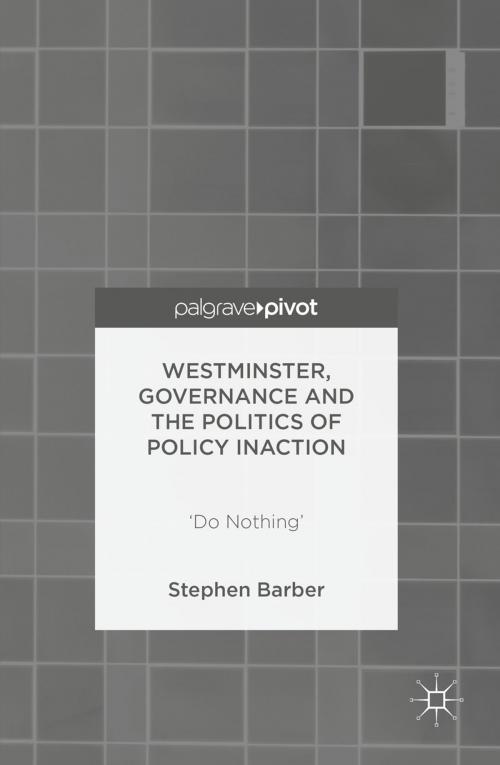Westminster, Governance and the Politics of Policy Inaction
‘Do Nothing’
Nonfiction, Social & Cultural Studies, Political Science, Government, Public Policy, International| Author: | Stephen Barber | ISBN: | 9781137487063 |
| Publisher: | Palgrave Macmillan UK | Publication: | November 24, 2016 |
| Imprint: | Palgrave Pivot | Language: | English |
| Author: | Stephen Barber |
| ISBN: | 9781137487063 |
| Publisher: | Palgrave Macmillan UK |
| Publication: | November 24, 2016 |
| Imprint: | Palgrave Pivot |
| Language: | English |
This book shows how political inaction has shaped the politics, economy and society we recognize today, despite the fact that policymakers are incentivised to act and to be seen to act decisively. Politicians make decisions which affect our lives every day but in our combative Westminster system, are usually only held to account for those which change something. But what about decisions to do nothing? What about policy which is discarded in favour of an alternative? What about opposition for naked political advantage? This book argues that not only is policy inaction an overlooked part of British politics but also that it is just as important as active policy and can have just as significant an impact on society. Addressing the topic for perhaps the first time, it offers a provocative analysis of ‘do nothing’ politics. It shows why politicians are rarely incentivized to do nothing, preferring hyperactivity. It explores the philosophical and structural drivers of inaction when it happens and highlights the contradictions in behavior. It explains why Attlee and Thatcher enjoyed lasting policy legacies to this day, and considers the nature of opposition and the challenge of holding ‘do nothing’ policy decisions to account.
This book shows how political inaction has shaped the politics, economy and society we recognize today, despite the fact that policymakers are incentivised to act and to be seen to act decisively. Politicians make decisions which affect our lives every day but in our combative Westminster system, are usually only held to account for those which change something. But what about decisions to do nothing? What about policy which is discarded in favour of an alternative? What about opposition for naked political advantage? This book argues that not only is policy inaction an overlooked part of British politics but also that it is just as important as active policy and can have just as significant an impact on society. Addressing the topic for perhaps the first time, it offers a provocative analysis of ‘do nothing’ politics. It shows why politicians are rarely incentivized to do nothing, preferring hyperactivity. It explores the philosophical and structural drivers of inaction when it happens and highlights the contradictions in behavior. It explains why Attlee and Thatcher enjoyed lasting policy legacies to this day, and considers the nature of opposition and the challenge of holding ‘do nothing’ policy decisions to account.















